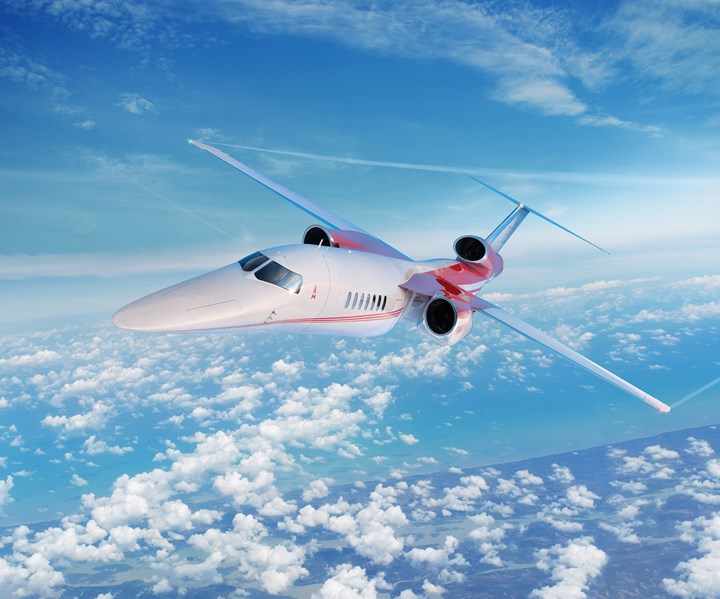Aerion Supersonic, Safran partner for AS2
Safran companies will design the engine nacelles, braking system and landing gear systems for the AS2 supersonic business jet.

Source | Aerion Supersonic
Supersonic aircraft technology developer Aerion Supersonic (Reno, Nev., U.S.) has selected technology group Safran (Paris, France) as a partner company for development of the AS2 supersonic business jet.
Two Safran companies have already joined the project to support the AS2: Safran Landing Systems (Canada and France) will design the complete braking and landing gear system, from main and nose landing gears, to wheels and brakes, including extension / retraction, monitoring and steering systems. Safran Nacelles (France) will design the AS2 nacelles, including the engines' inlets, fan cowl doors and thrust reverser.
First announced in 2014, the AS2 is reported to be the first privately built supersonic commercial aircraft. Designed to be inherently environmentally responsible, the AS2 is also said to be the first supersonic aircraft with the ability to accept 100% synthetic fuel and is the first to be designed without an afterburner. The 12-passenger business jet is scheduled to begin flight testing in 2024.
“Safran is a well-known global group that has been designing, developing and manufacturing aircraft equipment for over a century,” says Tom Vice, Aerion CEO. “It is that wealth of experience, paired with Safran's eye toward the future and our shared commitment to sustainability, that makes us feel so confident about this relationship.”
“We are thrilled to be part of this extraordinary technological project which requests from our engineers to imagine beyond their usual environment and design breakthrough technologies for the future of aviation,” says Philippe Petitcolin, CEO of Safran.
Other AS2 supplier partnerships announced over the past year include Spirit AeroSystems in February and GKN Aerospace in December.
Related Content
-
Microwave heating for more sustainable carbon fiber
Skeptics say it won’t work — Osaka-based Microwave Chemical Co. says it already has — and continues to advance its simulation-based technology to slash energy use and emissions in manufacturing.
-
Natural fiber composites: Growing to fit sustainability needs
Led by global and industry-wide sustainability goals, commercial interest in flax and hemp fiber-reinforced composites grows into higher-performance, higher-volume applications.
-
Novel composite technology replaces welded joints in tubular structures
The Tree Composites TC-joint replaces traditional welding in jacket foundations for offshore wind turbine generator applications, advancing the world’s quest for fast, sustainable energy deployment.

.jpg;width=70;height=70;mode=crop)














